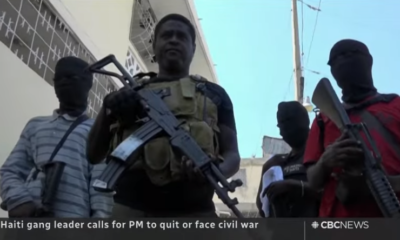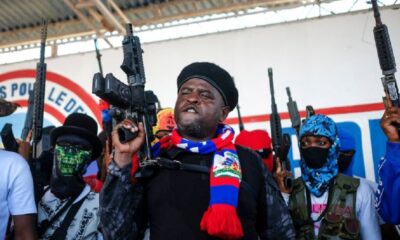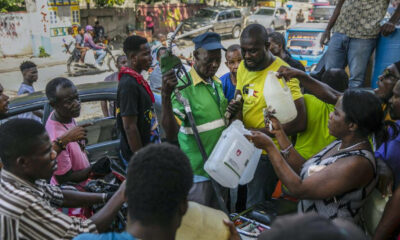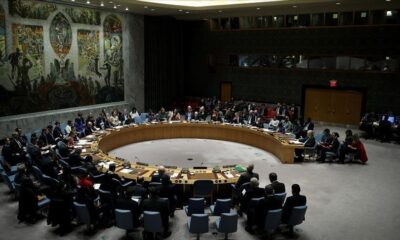Caribbean News
“Barbecue” is Cooked! US Turns Over 11 Million Haitians into Potential Informants with $5 Million Bounty
Published
5 months agoon

August 12, 2025
The United States just set fire to the underworld in Haiti — and this time, the smoke might finally flush out the man many call the most feared in the Caribbean.
On Tuesday, the U.S. government slapped a $5 million bounty on the head of Jimmy “Barbecue” Chérizier, the ex-police officer turned gang boss accused of orchestrating massacres, torching neighborhoods, and strangling Haiti’s capital into chaos. This isn’t just a headline — it’s a full-blown game-changer.
turned gang boss accused of orchestrating massacres, torching neighborhoods, and strangling Haiti’s capital into chaos. This isn’t just a headline — it’s a full-blown game-changer.
That kind of cash — offered under the State Department’s Transnational Organized Crime Rewards Program — is enough to turn the country’s entire population, more than 11 million people, into potential informants overnight. Add the millions in the Haitian diaspora, and Chérizier isn’t just wanted. He’s surrounded.
The Number That Changes Everything
Five million U.S. dollars today equals about 655 million Haitian Gourdes. In a country where many scrape by on less than $5 a day, that’s not just life-changing — it’s life-defining. It’s enough to rebuild homes, put generations through school, or buy a one-way ticket far from the gunfire.
In a place where trust is scarce and survival is everything, that figure is more than tempting — it’s irresistible. For Chérizier, it means every friend could be a future informant, and every loyalist might be calculating the cost of staying loyal.
‘We Will Find Them’ — Jeanine Pirro, U.S. Attorney
Jeanine “Judge Jeanine” Pirro, the U.S. Attorney, set the tone with fire in her voice. “This indictment is the first of its kind,” she announced. “Jimmy Chérizier, also known as ‘Barbecue,’ is a notorious gang leader from Haiti who has orchestrated and committed various acts of violence against Haitians, including the 2018 La Saline attack in which approximately 71 people were killed. He both planned and participated in that massacre.
“Anyone who is giving money to ‘Barbecue’ cannot say, ‘I didn’t know.’ They will be prosecuted, and we will find them. They are supporting an individual who is committing human rights abuses, and we will not look the other way.”
Pirro wasn’t just going after Chérizier. She was sending a warning to the Haitian diaspora accused of feeding his war chest from abroad: the days of claiming ignorance are over.
‘No Safe Haven’ — Darren Cox, FBI
Then came Darren Cox, Deputy Assistant Director of the FBI, delivering the muscle of America’s most powerful investigative force. “There is no safe haven for Chérizier and his network,” Cox declared. “We are closing every link, every cell.” Since January, he said, the FBI has arrested three Top Ten fugitives, taken more than 19,000 criminals off the streets, and seized thousands of tons of narcotics — enough to save millions of lives across the U.S.
The FBI’s Miami and Houston offices have already bagged one of Chérizier’s Viv Ansanm associates inside the United States without firing a shot. “These efforts are a deliberate and coordinated plan,” Cox said, “to protect our communities and confront escalating threats from terrorist organizations like Viv Ansanm.”
‘Three-Year Investigation’ — Ivan Arvelo, HSI
Ivan Arvelo, Assistant Director of Homeland Security Investigations, brought the receipts. “This is the result of a three-year investigation into Chérizier’s procurement networks, cash pipelines, and operational financing that violates sanctions,” he explained. Arvelo described 400 structures destroyed, entire communities erased, and a gang exploiting U.S. dollars, technology, and immigration loopholes to keep its killing machine running. “We tracked how Americans unwittingly bankrolled brutality,” he said — proof that the net is tightening both inside Haiti and abroad.
‘The Worst of the Worst’ — Chris Lambert, State Department
Chris Lambert, representing the State Department’s International Affairs division, gave the political bottom line.
“Mass violence in Haiti must end,” Lambert said. “The instability resulting from Chérizier’s actions fuels illegal migration, regional instability, and transnational crime. We will continue to apply every tool available — including our rewards programs — to stop the spread of unchecked violence, especially to target the worst of the worst criminal leaders threatening the people of our hemisphere.”
instability, and transnational crime. We will continue to apply every tool available — including our rewards programs — to stop the spread of unchecked violence, especially to target the worst of the worst criminal leaders threatening the people of our hemisphere.”
Lambert confirmed what many have long known: Chérizier is not just a gang leader. He commands Viv Ansanm, officially designated in May as a Foreign Terrorist Organization. In the eyes of the U.S., that makes him not just Haiti’s problem — but everyone’s.
Why Haitians May Not Resist
In Haiti, money talks — loudly. And when you put 655 million Gourdes on the table, it shouts.
That’s the kind of figure that turns casual acquaintances into informants and makes even the most hardened loyalist wonder if the payout is worth more than the risk. It’s not a matter of “if” word gets out, it’s a matter of “who will be first to collect.”
For grieving families, it’s a chance at justice. For the desperate, it’s a chance at survival. For Haiti as a whole, it’s hope — wrapped in the most dangerous of temptations.
An Answer to Prayers
For years, Haiti’s headlines have been a scroll of horrors — kidnappings, executions, burned neighborhoods, bodies in the streets. Chérizier’s name has been attached to too many of them.
This move by the U.S. isn’t just strategy. It’s personal. It’s a signal to every Haitian — at home or abroad — that the days of impunity could be ending.
I’ll admit it: when I heard the news, I danced, I sang, and I nearly cried. Not because $5 million is a lot of money, but because of what it means — the possibility, at last, of stopping the man accused of helping turn Haiti into hell on earth.
Four officials, four angles, one mission: Pirro’s fire, Cox’s grit, Arvelo’s precision, Lambert’s conviction. Together, they’ve put the heat on “Barbecue” like never before.
BBQ is cooked. The only question now is: which one of over 11 million potential informants will serve him up?
Caribbean News
Seven Days. Seven Nations. One Storm — Hurricane Melissa
Published
2 months agoon
November 1, 2025
A week of wind, water, and heartbreak
From Haiti’s hillsides to Bermuda’s reefs, seven Caribbean nations have been battered, bruised, and forever marked by Hurricane Melissa — a storm that tested not only the region’s infrastructure but its unshakable spirit of unity.
Saturday–Sunday, October 25–26 – The First Strike: Hispaniola
Before the storm even earned its name, torrential rain and flash floods swept across Haiti and the Dominican Republic, claiming lives and tearing through rural communities.
tearing through rural communities.
In southern Haiti, rivers burst their banks, swallowing roads and homes; 23 people were confirmed dead by Sunday evening. Across the border, one death was reported in the Dominican Republic as swollen rivers cut off villages in Barahona and Pedernales.
By nightfall, the tropical system had strengthened — and the Caribbean knew it was facing something historic.
Monday, October 27 – Evacuations and Airlifts
In The Bahamas, Prime Minister Philip Davis issued a mandatory evacuation for the MICAL Islands — Mayaguana, Inagua, Crooked Island, Acklins, Long Cay, and Ragged Island.
Bahamasair added extra flights as the nation braced for what forecasters warned could become the strongest storm in nearly two decades.
Meanwhile, Jamaica, Turks & Caicos, and Cuba activated their national emergency operations centers.
Tuesday, October 28 – Jamaica and Haiti Hit Hard
By afternoon, Hurricane Melissa made landfall near St Elizabeth, Jamaica, as a Category 5 hurricane — winds of 185 mph, central pressure 892 mb, the lowest ever recorded so close to the island.
Roads collapsed, bridges washed away, and Black River Hospital lost its roof. Power failed for 72 percent of the island.
BOJ TV footage shows split asphalt, sparking lines, and flooded communities abandoned for safety.
Initially four were reported dead, that grew to seven deaths and heavy damage in 170 communities; Andrew Holness, Jamaican Prime Minister calling it “a national test of resilience.”
Haiti, still recovering from the weekend’s flooding, was hit again as outer bands dumped more rain on Les Cayes and Jacmel, deepening the humanitarian crisis.
Wednesday, October 29 – Crossing to Cuba
Weakened slightly to Category 4 (145 mph), Melissa tracked north-northeast at 8 mph, hammering eastern Cuba with hurricane-force winds
and mudslides. Over 15 000 people were evacuated from Santiago de Cuba and Holguín.
In Turks & Caicos, the Regiment deployed to Grand Turk, Salt Cay, South, North and Middle Caicos, preparing shelters and securing public buildings.
Thursday, October 30 – The Bahamas and the All Clear
Melissa’s speed increased, sparing the northern Caribbean its worst.
The Bahamas Airport Authority closed 13 airports from Mayaguana to Exuma International; none reported casualties, though infrastructure suffered.
In Turks & Caicos, the all-clear came early Thursday after minimal impact. Premier Washington Misick expressed gratitude and pledged support for neighbors:
“We must act — not only with words, but with compassion and deeds.”
Friday, October 31 – Counting the Cost
By Friday, Melissa had weakened to Category 3 (120 mph) north of Cuba.
The Bahamas Department of Meteorology issued its final alert, lifting warnings for the southern islands.
Regional toll:
- Haiti: 23 dead, thousands displaced.
- Jamaica: 7 dead, 170 communities damaged; 72% without electricity
- Cuba: 2 dead, 15, 000 evacuated.
- Dominican Republic: 1 dead, flooding in southwest.
- Bahamas: 0 dead, minor infrastructure damage and flooding in southeast.
- Turks & Caicos: minimal to no impact.
Relief and Reconnection
The Cayman Islands became the first government to touch down in Jamaica post-storm. Premier Juliana O’Connor-Connolly led a contingent bringing a plane-load of essentials and pledged US $1.2 million in aid.
Reggae icon Shaggy arrived on a private jet with friends, delivering food, medical kits, and hygiene supplies.
Meanwhile, Starlink and FLOW Jamaica activated emergency satellite internet across Jamaica providing free connectivity through November.
From overseas, U.S. President Donald Trump, speaking during his Asia tour, announced that American search-and-rescue teams and disaster aid will support the region.
“They can depend on U.S. assistance as they recover from this historic storm,” he said.
Faith, Funds, and False Websites
The Government of Jamaica and the Sandals Foundation have both launched verified donation portals for recovery. Officials are warning against fake crowdfunding pages posing as relief sites and urging donors to use only official channels.
A Seventh Nation in the Crosshairs – Bermuda
As Hurricane Melissa left the Caribbean basin, Bermuda found itself next in line.
Forecasts indicated the storm would pass just west of the island late Thursday into Friday, likely as a Category 1 to 2 hurricane with sustained winds near 105 mph.
Though far weaker than when it ravaged Jamaica, officials issued a hurricane warning, urging residents to secure property and expect tropical-storm conditions.
By all appearances Bermuda is heeding the warnings
The Human Response
Across the Caribbean, solidarity surged.
The Global Empowerment Mission (GEM) in Miami began airlifting relief supplies, while churches, civic groups, and businesses in The Bahamas and Turks & Caicos organized drives for displaced families.
“Your dedication gave our islands the strength to face the storm,” Premier Misick said. “Together, as one Caribbean family, we will rise stronger.”
Resilience in the Wake
Melissa’s winds may have faded, but her impact endures. Engineers are inspecting bridges, hillsides, and water systems; volunteers are clearing debris and distributing aid in communities still cut off.
From Haiti’s ravaged river valleys to Jamaica’s sugar towns, from Cuba’s eastern hills to The Bahamas’ salt ponds and Bermuda’s reefs, the region once again stands at the crossroads of ruin and renewal — and leans, as always, toward hope and a faithful God
Caribbean News
Haitian Pushback Halts Controversial Constitution Rewrite — What’s Next?
Published
3 months agoon
October 15, 2025
Deandrea Hamilton | Editor
Haitian media, legal scholars and civic voices did what bullets and barricades couldn’t: they stopped a sweeping constitutional overhaul widely branded as anti-democratic. Editorials and analyses tore into proposals to abolish the Senate, scrap the prime minister, shift to one-round presidential elections, expand presidential power, and open high office to dual-nationals—a package critics said would hard-wire dominance into the executive at a moment of near-lawless insecurity.
The Venice Commission—Europe’s top constitutional advisory body—didn’t mince words either. In a formal opinion requested by Haiti’s provisional electoral authorities, it pressed for clear legal safeguards and credible conditions before any referendum, including measures to prevent gang interference in the electoral process—an implicit rebuke of pushing a foundational rewrite amid a security collapse.
Facing that drumbeat, Haiti’s Transitional Presidential Council has now formally ended the constitutional-reform initiative. The decision, taken at a Council of Ministers meeting at the National Palace, effectively aborts the rewrite track that has haunted Haiti since the Moïse and Henry eras.
So what now? Per the Miami Herald, the pivot is back to basics: security first, elections next. That means stabilizing Port-au-Prince enough to run a vote, rebuilding the electoral timetable, and empowering the provisional electoral machinery—none of which is simple when gangs control vast chunks of the capital and state authority remains fragile. Recent headlines underline the risk: gunfire has disrupted top-level government meetings, a visceral reminder that constitutional theory means little without territorial control.
Bottom line: Haitian journalists and public intellectuals helped slam the brakes on a high-stakes centralization of power that lacked legitimacy and safe conditions. International constitutional experts added weight, and the transition authorities finally conceded reality. Now the fight shifts to making an election possible—clean rolls, secure polling, and credible oversight—under circumstances that are still hostile to democracy. If the state can’t guarantee basic safety, any ballot is theater. If it can, shelving the rewrite may prove the first real step back toward consent of the governed.
Caribbean News
Political Theatre? Caribbean Parliamentarians Walk Out on House Speaker
Published
3 months agoon
October 14, 2025
By Deandrea Hamilton | Magnetic Media
October 14, 2025 – It’s being called political theatre — but for citizens, constitutional watchdogs, and democracy advocates across the Caribbean, it feels far more serious. Within a single week, two national parliaments — in Trinidad and Tobago and St. Kitts and Nevis — descended into turmoil as opposition members stormed out in protest, accusing their Speakers of bias, overreach, and abuse of parliamentary procedure.
For observers, the walkouts signal a deeper problem: erosion of trust in the very institutions meant to safeguard democracy. When Speakers are viewed as political enforcers instead of neutral referees, parliaments stop functioning as chambers of debate and start performing as stages for power and spectacle — with citizens left wondering who, if anyone, is still accountable.
October 6: St. Kitts Parliament Erupts
The first walkout erupted in Basseterre on October 6, 2025, when Dr. Timothy Harris, former Prime Minister and now Opposition Leader, led his team out of the St. Kitts and Nevis National Assembly in a protest that stunned the chamber.
led his team out of the St. Kitts and Nevis National Assembly in a protest that stunned the chamber.
The flashpoint came as the Speaker moved to approve more than three years’ worth of unratified parliamentary minutes in one sitting — covering 27 meetings and three national budgets — without individual review or debate.
Dr. Harris called the move “a flagrant breach of the Constitution and parliamentary tradition,” warning that the practice undermines transparency and accountability. “No serious parliament can go years without approving a single set of minutes,” he said after exiting the chamber.
The Speaker defended the decision as administrative housekeeping, but critics were unconvinced, branding the move a “world record disgrace.” The opposition’s walkout triggered renewed calls for the Speaker’s resignation and sparked a wider public discussion about record-keeping, accountability, and respect for parliamentary norms in St. Kitts and Nevis.
October 10: Trinidad Opposition Follows Suit
Four days later, on October 10, 2025, the Opposition United National Congress (UNC) in Trinidad and Tobago staged its own walkout from the House of Representatives in Port of Spain.
The UNC accused the Speaker of partisan bias, claiming she had repeatedly blocked urgent questions, ignored points of order, and allowed government members to breach standing orders without consequence.
“The Speaker has failed in her duty to act impartially,” the Opposition declared in a statement. “Parliament is not the property of any political party or Presiding Officer.”
The dramatic exit was seen as a culmination of months of rising tension and frustration, with opposition MPs arguing that parliamentary rules were being selectively applied to silence dissenting voices.
Political analyst Dr. Marcia Ferdinand described the twin walkouts as “a warning sign that parliamentary democracy in the Caribbean is teetering on the edge of performative politics.”
“When chairs become political shields rather than constitutional referees,” she said, “democracy becomes theatre, not governance.”
A Pattern Emerging
While St. Kitts and Trinidad are very different political environments, both incidents point to the same regional fault line: the perception that Speakers — the guardians of parliamentary order — are no longer impartial.
In Westminster-style systems like those across the Caribbean, the Speaker’s authority depends not on power but on public confidence in fairness. Once that credibility erodes, parliamentary control collapses into confrontation.
Governance experts say the implications are serious: eroded trust between government and opposition, declining public confidence in state institutions, and growing voter cynicism that “rules” are flexible tools of political advantage.
Why It Matters
Parliamentary walkouts are not new in the Caribbean, but what makes these recent events different is their frequency and intensity — and the regional echo they’ve created. Social media has amplified images of lawmakers storming out, with citizens from Barbados to Belize questioning whether the same erosion of decorum could be happening in their own legislatures.
the regional echo they’ve created. Social media has amplified images of lawmakers storming out, with citizens from Barbados to Belize questioning whether the same erosion of decorum could be happening in their own legislatures.
Analysts warn that if this perception takes hold, it risks diminishing the moral authority of parliamentary democracy itself.
“Once opposition MPs believe the rules are rigged, and once citizens believe Parliament is just performance,” said one Caribbean governance researcher, “you’ve lost the most valuable currency in democracy — trust.”
Restoring Balance
Political reformers across the region are calling for tighter Standing Order enforcement, independent parliamentary service commissions, and training to strengthen Speaker neutrality. Civil society leaders say the public must also play its part by demanding transparency and refusing to normalize partisan manipulation of parliamentary procedure.
Whether these twin walkouts become catalysts for reform — or simply another episode of Caribbean political theatre — will depend on what happens next inside those chambers.
For now, democracy watchers agree on one thing: when opposition leaders feel the only way to be heard is to walk out, the entire democratic house — not just its Speaker — is in danger of collapse.
Angle by Deandrea Hamilton. Built with ChatGPT (AI). Magnetic Media — CAPTURING LIFE.














